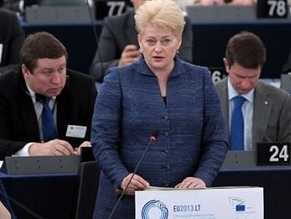|
World Jewish News

Lithuanian President Dalia Grybauskaite paid tribute to Europe’s support of Lithuania’s post-communist moves towards independence in a speech to the European Parliament plenary session in Strasbourg on Wednesday.
|
Lithuania pledges to focus on ‘our Mediterranean neighbours’ at start of EU Presidency, as it commits to an open Europe ‘ready b
04.07.2013, Jews and Society Lithuania assumed its six-month presidency of the EU Monday to succeed Ireland as Lithuanian President Dalia Grybauskaite paid tribute to Europe’s support of Lithuania’s post-communist moves towards independence in a speech to the European Parliament plenary session in Strasbourg Wednesday, concluding: “It was here, in the European Parliament, more than two decades ago, that the Lithuanian cry for freedom was first heard, and, with your ringing endorsement, transmitted to the world.”
Committing to maintaining “shared European values”, despite the diverse societies comprised by its 28 member states, she added it was the new presidency’s “duty” to make the European values of peace, democracy and prosperity “a reality for every European citizen”, just as EU membership had done for the Lithuanian nation.
Grybauskaite also made a point of looking beyond Europe’s immediate borders, as she highlighted the need “to achieve free trade arrangements with Europe’s trading partners”, as she vowed to reengage with “our Mediterranean neighbours”. After Israel officially recognised Lithuania’s independence in 1991, the two countries established full diplomatic relations the following year, and are both full members of the Union for Mediterranean. Last October MEPs in Strasbourg passed a highly contested ACAA trade agreement between the EU and Israel which aims to eliminate trade barriers to Israel’ advanced pharmaceutical products entering the European market.
Expounding an agenda that focuses heavily on promoting the EU’s long-term economic growth, reducing youth unemployment and energy prices and ensuring a more secure neighbourhood beyond its borders, in light of recent civil unrest in Egypt and aspiring accession candidate Turkey, she also focused on expanding the European family, as Croatia enters the union as its 28th member state. In an apparent open-arms message to Turkey, as accession negotiations similarly move to the next stage with fellow candidate Serbia, she echoed European Parliament president Martin Schulz’s insistence that “those partners who have made their European choice must know that they too are welcome, when they are ready, to join our family”.
Congratulating Croatia on meeting the criteria of EU membership, she added: “The conditions of membership are, by design, challenging. Those who overcome the challenges are those who see the European Union as open, and ready both to give and to receive.”
Referencing the EU’s receipt of the Nobel Peace Prize last year, the Lithuanian head of state insisted Europe was “at it best when it has been an open Europe”, drawing on its foundations of post-conflict reconciliation, as well as its defence of the values of peace, democracy and human rights. Her words echoed EU Council head Herman Van Rompuy’s own rhetoric in acknowledging the award last December, when he said it was a tribute to “all the Europeans who dreamt of a continent at peace with itself, and to all those who day by day make this dream a reality”.
With a population of 3.3 million, Lithuania has been a member of the EU since 2004. Historically home to a significant Jewish community, which numbered approximately 220,000 before WWII, equating to about 7% of the overall population, the vast majority of its Jewish community was wiped out following the German invasion of the country in June 1941, by a combination of the Nazis and Lithuanian collaborators. In total, approximately 206,800 Lithuanian Jews perished during the Holocaust, 95% of its original community.
Today, approximately 5,000 Jews are thought to remain in the country.
Last year, Lithuania saw a slight surge of anti-Semitic activity, when a century-old renowned Vilnius synagogue was vandalised in the aftermath of a contentious decision to grant a state-funded reburial to the country’s notorious 1941 pro-Nazi leader. Unknown attackers daubed the Choral Temple, the only remaining active synagogue in a city which boasted more than one hundred pre-Holocaust, in green paint last May.
The attack followed a government-backed funeral ceremony to bury the ashes of Juozas Brazaitis in Kaunas, despite protests from the Jewish community who claim he “collaborated” with the Nazis during the war.
Brazaitis died in exile in the United States in 1974, having assumed power in Lithuania in 1941, when Nazi Germany drove out the Soviets, following their year-long brutal occupation of the country. He was buried in a Cathedral ceremony to the tune of the Lithuanian national anthem.
Last May, Lithuanian Foreign Minister Linas Linkevicius visited Israel where he met Israeli President Shimon Peres, Prime Minister Benjamin Netanyahu, Justice Minister Tzipi Livni, Knesset Speaker Yuli Edelstein and Avigdor Lieberman, Chairman of the Knesset Foreign Affairs and Defense Committee.
During the meeting with President Peres, Linkevikius spoke of the ‘’deep and longstanding relations’’ between the two countries and of the many Israeli's of Lithuanian origin including journalists, diplomats and public figures.
He assured Peres that Lithuania is a friend of Israel and, while not taking sides, will support Israel during the its EU presidency.
Among the planned events will be the Fourth World Litvak Congress to bring together Jewish descendents of the so called “Litvak” lands, which include Lithuania, Belarus, Ukraine and northeastern Poland.
Linkevicius said that he was struck during his visit in Israel how many people he met were “Litvaks.”
“We have 700 years of common history,” he said. “Before WWII there were more than 200,000 Jews living in Lithuania. Unfortunately, almost all of them were killed, which is a tragedy not only for your nation but also for Lithuania. Because it was part of our face, part of our culture, heritage and history,” he said.
by: Shari Ryness. Yossi Lempkowicz contributed to this report.
EJP
|
|
